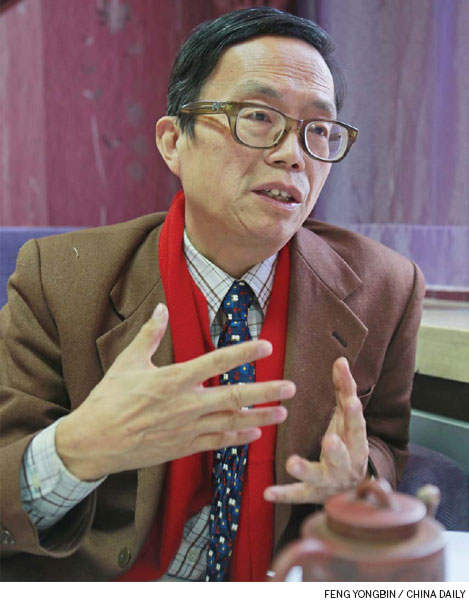Dead ends, new beginnings


African nations must forge their own development path, says expert
This story was originally published on Jan 18, 2013
Li Anshan believes that African nations should define their development goals more clearly and ensure that they are not unduly affected or obstructed by external influence.
The 59-year-old director of the Center for African Studies at Peking University and a leading Chinese expert on African affairs says it is heartening to note that in recent years many African countries have grown a strong sense of initiative in their development.
"The advantage of such an approach is that they (African nations) will be able to forge a development path that is independent of others, and also draw valuable lessons from the path followed by others."
Li says that though 20 of the 54 countries in Africa have witnessed fast economic development, it has mostly been conditional and linked to overall stability.
"One of the big hurdles for development in Africa has been the rampant external interference. If there is less foreign intervention and a commitment for development from African leaders, there is no reason why Africa cannot surpass others in economic growth," Li says.
Li says that Western aid for Africa has always been conditional and comes with strings attached.
"What Africa really needs is economic agreements that are complementary to development, and not one-sided as most Western agreements tend to be," he says.
"There are 17 conditions that African nations have to adhere to if they want assistance from the Millennium Challenge Corporation (an independent US government foreign aid agency). If the African nations can adhere to all these, then the real question is whether they need the assistance at all?"
Li says that though Western nations have been providing assistance to Africa for almost five decades, the results have not been encouraging.
"Unfortunately, in most cases, the assistance was not used for the right purposes," he says.

Li cites what he read from American professor Deborah Brautigam's book Dragon's Gift: "The former foreign minister of Sierra Leone Aalhaji Momodu Koroma once compared China with other donors: 'There is a difference, and it is huge. What they want to help you with is what you have identified as your need. With Britain, America, they identify your needs.'"
Li says: "Leave them alone if they (African nation) cannot be provided with the aid they want. What is the use of giving something with conditions attached to it?"
Li says that Western countries should not provide what they want, but rather give according to the real needs of the African nations.
According to Li, China has the best credentials among all nations to expand cooperation with African countries, especially in sectors other than agriculture, manufacturing, food and natural resources.
"Take renewable energy as an example," Li says.
"Some countries have already started to team up with African countries in this regard and China should also seize the opportunities."
Li suggests Chinese companies set up joint ventures with African partners who know better about laws, regulations, investment environment and market channels.
Bilateral trade between China and African countries rose to $200 billion in 2012 from $10 billion in 2000, according to figures provided by the Ministry of Commerce.
"In the past, Italy imported olive oil from North Africa and then sold it to China, while Germany sold China ebony imported from East Africa," he says.
"With more Chinese consumers getting interested in African products, I believe there will be even more opportunities for Chinese and African businesses to work together."
Li says Africa is the right place for many Chinese enterprises to expand their businesses and often cites the examples of Huawei and ZTE which have tasted success.
"In many respects, Africa is still a virgin territory for businesses and hence does not pose too many problems for Chinese companies, unlike the mature and developed markets in Europe and the US."
Li says that when he took his master's degree in African history from the Graduate School of the Chinese Academy of Social Sciences in 1984 in Beijing, little did he realize that he would be an expert on African affairs.
His Africa connection was established at the University of Toronto in Canada during his doctoral studies after coming under the wings of Martin Klein, a global authority on African history.
"Like other continents, Africa has its history, culture and civilization. More importantly, even in the modern society there are still some good aspects of Africa that are worth emulating."
Li says that in South Africa, there are as many female employees as there are male employees at the Foreign Ministry. This, in itself, is a role model for women's participation in politics for any other nation in the world.
Li, who has visited 16 African countries, says that the African spirit of optimism, the love and respect for nature, and the family values are the traits that he admires most.
But at the same time there are also many serious issues such as population levels, youth unemployment, health and food security, that need urgent attention.
In a new book titled What Went Wrong with Africa? A Contemporary History, written by Dutch diplomat Roel van der Veen, Li was asked to write a blurb for it.
"The author thinks Africa has turned into a failure after their independence of 50 years, but I do not agree with that," Li says.
"After hundreds of years of the slave trade and colonial rule, African countries survived and recovered and some of them are making economic progress today.
"The spirit of their toughness, firmness and vitality should be respected by all of us."
(China Daily Africa Weekly 01/17/2014 page11)
Today's Top News
- Mainland increases entry points for Taiwan compatriots
- China notifies Japan of import ban on aquatic products
- Envoy: Japan not qualified to bid for UN seat
- Deforestation is climate action's blind spot
- Japan unqualified for UN Security Council: Chinese envoy
- China, Germany reach outcomes after discussions






























